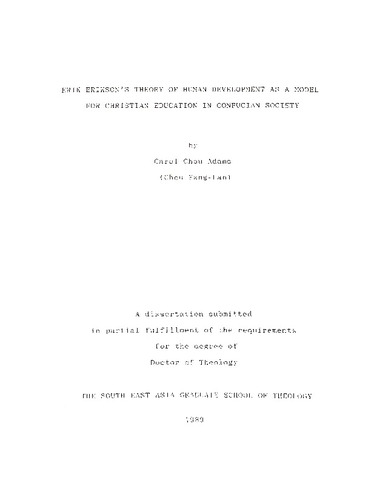Erik Erikson's theory of human development as a model for Christian education in Confucian society
Аннотации
This study proposes Erik Erikson's theory of human development as a model for the Christian education enterprise in the context of Confucian society. The methodology utilized considers the following criteria: problem, process, context, content, theory, program, and prospects.
The problem under consideration is that religious development does not keep pace with biological, psychological, and social development. The Christian education process frequently stops at adolescence and does not resume until late middle age or even retirement. This is due in part to the emphasis upon Christian education for children and youth and the neglect of adult Christian education, particularly for young adults.
In recent years there has been an emphasis upon adult education. This in turn has made educators aware of the fact that learning is a process that continues throughout the entire human life cycle. We show how human development theory has served to focus attention upon the life-long process of education in general and Christian education in particular.
The context for Christian education in this study is Confucian society. The focus is upon China, Korea, and to a lesser extent Japan as well as those areas with predominantly ethnic Chinese populations such as Taiwan, Hong Kong, and Singapore. It is shown that Confucian society has a highly structured theory of human development with content and a process by which its goals can be achieved. Furthermore, Confucianism has adjusted to modernization with varying degrees of success. At the same time we find that the Confucian understanding of human development, is culturally conservative, practically dualistic, and theologically ambiguous.
In considering human development from a Christian perspective the focus is upon the content of the Christian faith which in turn gives guidance and direction to the process of human development. A descriptive view of Confucian thinking must be balanced by a prescriptive Christian view which moves beyond cultural captivity, overcomes dualism, and seeks theological clarity. A Christian understanding of human development is also biblically grounded historically informed, communally nurtured, ecumenically involved, socially engaged and mission oriented.
The human development theory of Erik Erikson provides a model that can he applied to Christian education in Confucian society thus bringing together process, context, and content in the effort to reach a solution to the problem of arrested religious development. Erikson is selected because his eight stages of human development cover the entire life cycle and have broad applications. Furthermore, Erikson is concerned with virtues and ethics and understands the importance of ritual and religion. His theory is compatible with both Christian faith and Confucian society.
A program by which human development may serve as a model for Christian education in Confucian society is presented using Erikson's theory and insights from the Christian faith. The Human life cycle in contemporary Confucian society is examined in terms of religious socialization (which is largely informal and unintentional) and Christian education (which is largely formal and intentional). Opportunities for Christian education are highlighted at each stage of the life cycle as it is experienced within Confucian culture. Suggestions are made as to how Christian educators may use Erikson’s eight stages to provide Christian answers to dilemmas posed within Confucian culture.
This study concludes with some prospects for the future. These include observations on how Christian education can serve as a bridge between human development (which is universal) and Confucian culture (which is particular). Questions are raised concerning Erikson’s theory from the perspective of the position of women, the role of ethics, and the importance of religion. Suggestions are then made as to how this human development model of Christian education may serve as the basis for programs of theological education, curriculum development, and workshops in the churches. A human development model applied to Christian education in Confucian society is one way of ensuring that Christian growth continues throughout the entire life cycle.
Описание
Abstract only
Suggested Citation
Adams, C. C. (1989). Erik Erikson's theory of human development as a model for Christian education in Confucian society [Unpublished doctoral dissertation]. South East Asia Graduate School of Theology
Type
DissertationТематика
Keywords
Department
South East Asia Graduate School of TheologyDegree
Doctor of TheologyShelf Location
BT 212 .A33 1989
Physical Description
viii, 213 leaves


